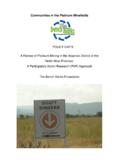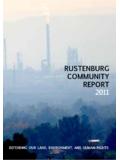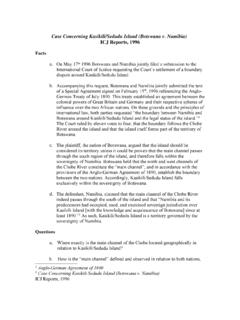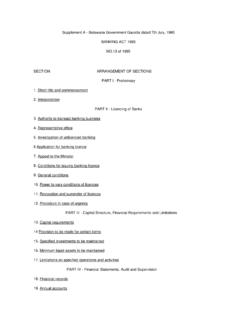Transcription of De Beers, Botswana and the Control of a Country
1 Policy Gap 5 SADC Research Corporate Social Responsibility in the Diamond Mining Industry in Botswana De Beers, Botswana and the Control of a Country Bench Marks Foundation 20092 Policy Gap 5 SADC Research Report CORPORATE SOCIAL RESPONSIBILITY IN THE DIAMOND MINING INDUSTRY IN Botswana by David van Wyk 2009 Research commissioned by the Bench Marks Foundation This research was made possible by the core support of Christian Aid in London, Diakonia Sweden and EED in Germany 3 Foreword The Bench Marks Foundation is an independent church based non governmental organisation monitoring corporate performance in the field of corporate social responsibility (CSR) with a focus on sustainable practices that address labour rights, community rights, gender concerns, HIV/AIDS, and a sustainable system of production. In this regard we promote evenly economic development in the African continent. We address these concerns through our measuring tool, the Principles for Global Corporate Responsibility; Bench Marks for Measuring Business Performance.
2 Its mandate is to examine the role of business in the new South Africa and beyond our borders to realise human rights and promote human dignity. Our main focus in South Africa is around natural resources, in particular mining, its impact on the environment, women, HIV and AIDS, and particularly on communities close to mining operations. We believe that the starting point of economic life is the community and the sustainable development of peoples. CSR is more than philanthropy and reporting, it is also the strategic interventions that benefit both the corporation and society and that promotes a rights based approach and a developmental angle to companies CSR commitments. The Bench Marks Foundation believes that the gap between policy and corporate practice needs to be addressed and CSR integrated into the core of companies decision-making processes in order to overcome poverty, growing inequalities and degraded environments.
3 The Foundation s studies in mining industry point to a number of interventions that can and must be made that will ultimately provide positive results for communities and the environment. In South Africa, as in the SADC region, the rush for investment, particularly in the resource extraction sector, often allows for the outflow of economic wealth whilst leaving host countries and communities further impoverished. This impoverishment is seen economically, socially and environmentally and in people s struggles for a meaningful life and dignity. The SADC region is a mosaic of countries all at different developmental and political stages. The region holds about 50% of Africa s total mineral wealth. The mining sector in Southern Africa has been going through a massive growth period considering rising mineral and commodity prices although starting to decline.
4 Political leaders in the subcontinent are implementing a number of strategies aimed at creating a friendly investment climate conducive to exploration and mining activities in the region. However, instead of providing more negotiation power to the SADC countries, mining multinational companies in the region have implemented a divide and rule strategy to seek out the Country with the weakest mining legislation. There are low levels of accountability, transparency and commitment to all aspects related to sustainable development and corporate social responsibility in the mining arena of the SADC region and for business in general. Multinational companies need to focus their corporate social responsibility programmes on the real sustainable development of communities rather than as publicity exercises. They also need to adhere to international good practice and or standards and instruments guiding this.
5 4 This study poses a challenge to the diamond companies to improve on their corporate responsibility programmes and to find innovative ways to promote development at community level that addresses some of the negative impacts mining brings. I trust that the study will be received warmly by both the corporations studied and various branches of government involved. The Rt. Rev. Dr. Jo Seoka Chairperson Bench Marks Foundation 5 Introduction This study of corporate social responsibility in the diamond mining industry in Botswana deals with the nature of mining investment in Botswana , the conflict of interest between the government and De Beers, and the impact of mining on indigenous peoples. Botswana relies predominantly on one commodity diamonds to finance state expenditure, create jobs and contribute to GDP. This dependency creates a problem for the long-term sustainable economic development in Botswana .
6 The global financial crisis has led to De Beers closing many operational plants, retrenching workers and leaving whole communities destitute. Part of the problem is the accumulation of profit by mining companies in an environment of inequitable distribution of benefits. The working class and poor suffer as second-class citizens and disposable labour while the mining companies produce glossy sustainability reports, showing Botswana as an African success story and a truly democratic and sustainable society. This raises the question of economic justice for De Beers when in bad times, workers and their communities are discarded in the name of shareholder returns. The group that can least afford it loses out to the group who can most afford it. Should not companies and government strategy be directed to sustaining communities? In upturns why can t a sustainability fund be developed that caters for worker and communities in downturns?
7 This report highlights some of the key contradictions around mining and development as it relates to indigenous communities, their forced removals to make way for mining and raises a host of questions around ecological areas like the Okavango Delta and the Kalahari Game Reserve. While De Beers gives a lot to state coffers, this relationship is also riddled with complexities, where the Botswana government benefits revenue wise, but appears to lack the political will to ensure mining does not harm indigenous communities. This is a corporate challenge and De Beers needs to state what their position is regarding indigenous communities. This report also raises the issue of shady mining interests by Gem Diamonds in the Central Kalahari Game Reserve. The government has evidently banned indigenous people from using their water holes and the mining license is depended upon Gem Diamonds not supplying water to them.
8 As long as mining houses disregard their duty to consider the interests of all stakeholders and get away with negative environmental and social impacts such as damaged eco-systems and dispossessed and disempowered communities the road to sustainable development will be long and arduous. The Bench Marks Foundation tool, Principles for Global Corporate Responsibility, Bench Marks for Measuring Business Performance shows that De Beers has a long way to go to becoming a good corporate citizen. De Beers needs to be able to show that their operations are fair, just and that profits they make are done so ethically. John Capel Executive Director Bench Marks Foundation 6 Executive Summary This research on corporate social responsibility (CSR) and the extractive industry in Southern Africa is a research project of the Bench Marks Foundation in collaboration with the Peace, Principles and Participation Network (PPP) covering Angola, the DRC, Malawi, Mozambique, South Africa and Zambia a multi-sectoral grouping that has evolved primarily for purposes of advocating for equitable distribution of wealth and developmental benefits at grassroots levels emanating from extractive industries operating across the Southern African Development Community (SADC) region.
9 The initiative is supported by the Netherlands Institute for Southern Africa (NIZA) and arises from research completed by the Bench Marks Foundation on Rustenburg Platinum Mines and extended by the PPP meeting of November 2006 in Durban, South Africa. At this meeting it was decided to focus the research on the applicable legislation, policies and practices in the extractive industries in the above-mentioned countries in the SADC region. International best practice and benchmarking conceptualised and monitored by the Bench Marks Foundation as specified in the Bench Marks framework, Principles for Global Corporate Responsibility: Bench Marks for measuring Business Performance, (the Bench Marks tool) are key principles in the design and execution of the research. Mining-related developmental issues - against the background of the social responsibility of the industry - that will be raised in this project will, amongst others, be the following: health and safety, security, education, migrant and settlement patterns, environmental management, poverty eradication, job creation, local economic development, gender, HIV/AIDS, measurement of development needs of communities, etc.
10 The first phase of this SADC research project, completed and launched in June 2008, involved the mining activities in Malawi (uranium), South Africa (coal, gold, platinum and uranium) and Zambia (copper and cobalt). This research on the diamond industry in Botswana is therefore a continuation of the broader SADC research initiative into the extractive industry. Mr David van Wyk (North-West University) conducted the research and was supported by Prof Freek Cronj , and by Ms. L. Grimbeek both from the North-West University (Potchefstroom Campus. Mainly three basic research procedures were used for the project: the historical procedure, survey procedure and historic-comparative procedure. The key issues (findings) that came to the fore from the research are categorised under the three dimensions of sustainable development (economical, environmental and social). Integrated within the findings of this research are certain relevant Principles, Criteria and Bench Marks1 - printed in bold, that serve as measuring standards for the mining companies CSR performances.)













